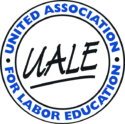Mission Statement
The Labor Studies Journal is the official journal of the United Association for Labor Education (UALE). It is a multi-disciplinary journal which seeks submissions based on research about work, workers, labor organizations, and labor studies and worker education in the US and internationally.
The Journal is interested in manuscripts using a diversity of research methods, both qualitative and quantitative, directed at a general audience including union, university, and community based labor educators, labor activists and scholars from across the social sciences and humanities. As a multi-disciplinary journal, manuscripts should be directed at a general audience, and care should be taken to make methods, especially highly quantitative ones, accessible to a general reader. Topics range from:
- Union organizing strategies
- Labor movement revitalization
- New forms of worker representation (labor centers, etc.)
- Race, gender and “identity” issues and labor
- Immigration and labor
- Globalization and labor
- Labor and political trends
- International labor movements
- Labor education practices and approaches
- Labor and the evolving economy
In addition to articles about the United States labor movement and workforce, LSJ welcomes submissions that are international and comparative. We are interested in foreign based authors who are writing about relevant subject matter in non-US countries, which have significant international or comparative implications for labor studies.
LSJ is interested in manuscripts using a diversity of research methods, both qualitative and quantitative that use ethnographic, theory-building, and formal econometric modeling. The Journal publishes empirical research in order to advance theory that expands understanding and analysis of the field of labor studies. LSJ welcomes innovative and new approaches to the study of workers directed at a general audience including union, university, and community based- labor educators, labor activists, and scholars from across the social sciences and humanities.
The Journal also includes a variety of sections such as:
- reviews on relevant books, audio-visual, and electronic materials
- a forum for discussion of issues about work and labor
- a non-refereed section highlighting innovations in labor education and labor practice
This journal is a member of the Committee on Publication Ethics (COPE).
Editors and Editorial Board of the Labor Studies Journal
Co-Editors
Bob Bruno, University of Illinois at Urbana-Champaign
Victor Devinatz, Illinois State University
Book Review Editor
Ericka Wills, Los Angeles Trade Technical College
Interactive Issue Editor
Victor Devinatz, Illinois State University
Innovations Section Editor
Emily LB Twarog, University of Illinois at Urbana-Champaign
Editorial Board Members
Steven Ashby, University at Illinois at Urbana-Champaign
WIlliam Brucher, Rutgers University
Adrienne Eaton, Rutgers University
Lynn Feekin, University of Oregon
Elizabeth Hoffman, Purdue University
Tom Juravich, University of Massachusetts at Amherst
Stephanie Ross, York University, Canada
Larry Savage, Brock University, Canada
Katherine Sciacchitano, National Labor College
Jennifer Sherer, University of Iowa
Louise Simmons, University of Connecticut
Emily LB Twarog, University of Illinois at Urbana-Champaign
International Editorial Advisory Board
Canada
Gregor Murray, University of Montreal
Ann Frost, University of Western Ontario
Charlotte Yates, McMaster University
Great Britain
Ed Heery, Cardiff University
Peter Fairbrother, Cardiff University
John Kelly, Unversity of London
Australia
David Peetz, Griffith University
Barbara Pocock, University of Southern Australia
Far East
Anita Chan, University of Technology, Sydney
Edson Urano, Sophia University
Latin America
Enrique de la Garza Toledo, Autonomous Metropolitan University, México
Graciela Bensusan, Autonomous Metropolitan University, México
Africa
Eddie Webster, University of the Witwatersrand
European Continent
Jean Yves-Boulin, University of Paris-Dauphine
Thomas Greven, Feree University of Berlin
